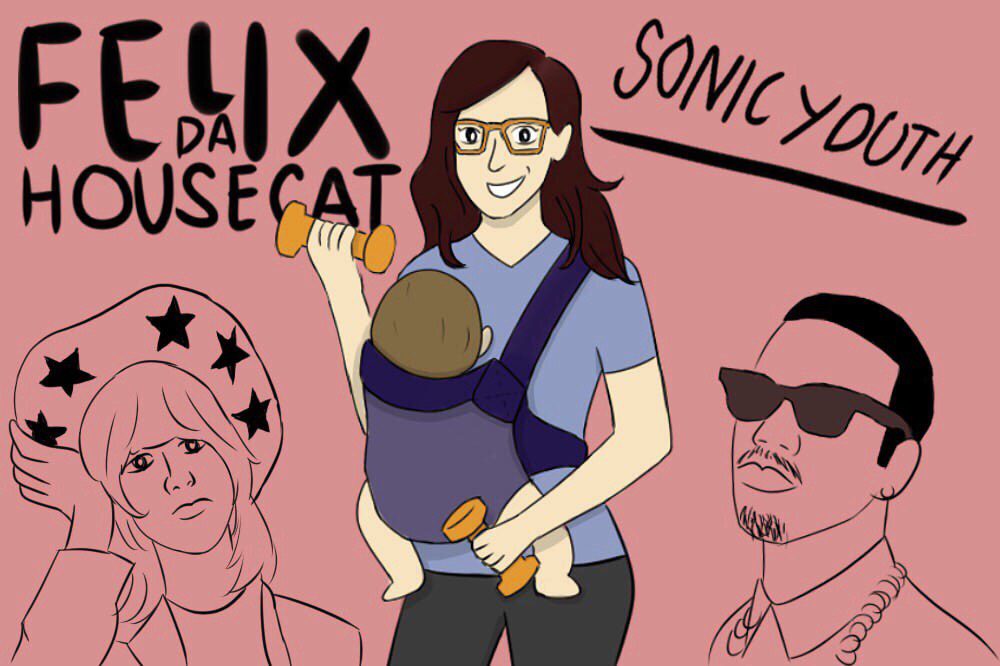

ONLY NOISE explores music fandom with poignant personal essays that examine the ways we’re shaped by our chosen soundtrack. This week, Liz Tracy reconnects to her former self via the music she loved before she became a mom.
In the tiny basement gym in my parents’ apartment building, I gingerly stepped on the elliptical machine. I felt like a barefoot child about to climb a mountain, unsure of my intentions, safety, and abilities. In the two years since I gave birth, I haven’t had many opportunities to move my body or use my mind without the goal of keeping my young son alive or entertained. I put my headphones on and pressed play on iTunes. Music long kept silent on my phone quickly flooded my brain with memories and emotions. Suddenly, my legs knew what to do. I felt like I hadn’t in a long time: I felt like I was back in my body.
Since I found out I was pregnant in a Walmart bathroom, almost everything in my life changed. I grew a human baby in my uterus and breastfed him for 19 months. My partner and I stopped drinking and attending beloved music shows regularly. We also moved to two new states. I work from home now while caring for a small, energetic person who demands more from me than I even demand from myself. Yet I still have the same old anxiety disorder, amped up on new worries with no outside substances to quiet my fears. By 5pm each day, I’m usually so worn out and overwhelmed by my full-time childcare duties, I feel like I’m floating above my life. After our most recent move, I decided to find a space where I could reconnect with my pre-baby self, and manage my anxieties. I found it in that tiny gym thanks to a soundtrack of my old favorite songs.
I’m not the only person seeking ways to process unwanted feelings in the wake of a pregnancy. The Center for Disease Control estimates that one in five women and five percent of men experience postpartum depression, 10 percent of women have postpartum anxiety, while others suffer from postpartum obsessive-compulsive disorder and postpartum post-traumatic stress disorder. If you’ve ever spoken to a new parent or looked at posts in a Facebook parenting group, you know these numbers are much lower than the reality. Studies have shown not only that exercise can help parents deal with postpartum mood disorders, but also that music can help with the baby blues and maternal attachment in the weeks following childbirth. It’s not new news that music can be therapeutic, but in my postpartum haze, I didn’t even consider it as a solution to my ailments.
I have nothing to focus on in the gym but the music and myself. I become immersed in each note and lyric, each bead of sweat. I can explore my muddied emotional landscape and crowded thoughts in a space all my own. I channel all of my rage from a traumatic childbirth experience and the shameful lack of childcare options that are stalling my career by swinging my arms furiously to noise gods Sonic Youth. I particularly enjoy getting angry to “Swimsuit Issue” off the band’s 1992 release Dirty, which I first owned on cassette.
The Sonic Youth Information Database quotes the album’s deluxe reissue liner notes on the song’s meaning, “…inspired by the odious ejaculative habits of a then-current [Geffen] employee who was subsequently remanded to therapy.” Kim Gordon lists the models in from the March 1992 Sports Illustrated Swimsuit Issue in the outro. I’ve never had envious thoughts about supermodels – I know they live the same shitty lives as the rest of us. They get old and their husbands cheat on them. Thurston Moore left Kim Gordon in much the same fashion, but she subsequently became more famous after his departure. The dark humor of the song reminds me of long nights I spent sweating and laughing through weirdo noise shows in Miami, where I used to live. I was as feral as the wild sounds coming from those stages.
When I play Chicago electronic musician Felix Da Housecat’s “Ready 2 Wear,” a New Wave-y house masterpiece, my legs move twice as fast and my chest swells with longing for late nights when my feet stuck to dirty dance floors at kitchens and clubs. I’m saturated with feelings about years spent with friends whose drama seemed crafted to hurt but was actually an effort by screwed up codependents to connect and maintain intimacy. I recall the many times we scrambled to keep each other alive and hopeful by clinging to the unhealthy, temporary healing powers of parties, intoxication, and conversations until dawn.
Always a fan of filthy music, I remember thinking Juicy J was an egalitarian hero with his line “you say no to ratchet pussy, Juicy J can’t” in “Bandz a Make Her Dance.” But now, as I cycle on a stationary bike through this trap tune, I wonder how I would explain that line to my son when he’s older. Parenthood brought out some latent puritanical side of my personality that mixes awkwardly with my affinity for crass humor and music. So, for the thirty minutes I spend in the gym, I try to set aside my uptight feelings and just enjoy the Lil Wayne feature on this song.
The inspiration for alt-country, the late Gram Parsons, is also on my list. He and Emmylou Harris harmonize beautifully on “Return of the Grievous Angel,” a tune about a man who has traveled the world but can’t quit his lover. It is then that I remember my pre-baby trips. A decade ago, I drove across the country with my brother’s friend for a month to visit the Joshua Tree Hotel where Parsons overdosed and died. I remember seeing the milky way on my second trip there by laying on the hood of a rented car with my old roommate. Because these musical workouts alleviate my anxiety, I can feel the freedom of those times again. I think briefly about all the world I won’t be able to afford to see and won’t have the time to visit now that I have a child. I start to process that without a conclusion.
Then I walk upstairs and open the door to the apartment where we now live with my parents. I hear the immense giggles of a big-eyed human that I somehow created and whose life I now sustain. I can actually feel my legs and the ground beneath me and sweat on my shirt. My partner comments how different I look with my skin flushed. The disorderly fragments of my past and present that floated around inside me, the heavy rocks of anxiety that weighed me down just an hour before, have fallen into place.



